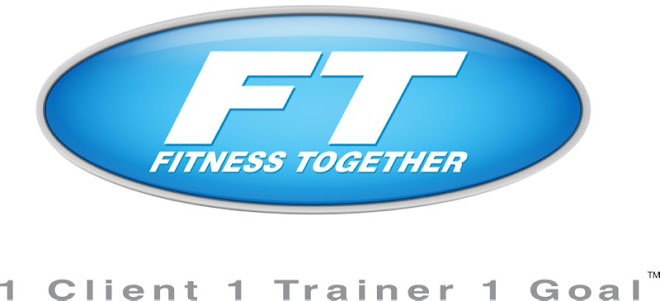Serotonin, a chemical present in your brain, has a huge affect on your overall daily health. What is serotonin you ask? Well, serotonin acts as a neurotransmitter, a type of chemical that helps relay signals from one area of the brain to another. Although serotonin is manufactured in the brain, where it performs its primary functions, some 90% of our serotonin supply is found in the digestive tract and in blood platelets. To learn about eight other ways this important chemical affects our health both phusically and emotionally visit this page at WebMd.com.
Fitness Together Lake Forest
1 Client. 1 Trainer. 1 Goal.
1 Client. 1 Trainer. 1 Goal.
Wednesday, January 27, 2010
Tuesday, January 12, 2010
Ask the Dietician...

Q: I am trying to be mindful of the sodium listed on food labels. How much is too much?
A: One quick tip is to look at the “% DV” (percent of Daily Value) listed for sodium. Total daily sodium consumption should be less than the DV of 2,400 milligrams (mg). If a food supplies 20 percent of sodium’s DV (480 mg), it is considered high in sodium. If the product is a whole meal or a prepared main dish, more than 600 mg per serving is considered high.
If you eat out a lot or tend to eat high-sodium snack foods or processed foods, you should practice extra caution with your other food choices. Aim to fill the majority of your diet with naturally low-sodium vegetables, fruits and unprocessed grains. Also note that the nutrient content percentages on food labels apply to the designated serving size. If you eat a larger portion than what is listed, you can quickly increase your sodium intake. Finally, since the “% DV” refers to the limit of 2,400 mg of sodium, it’s not an accurate gauge of the 1,500 mg limit that is recommended for those who are salt-sensitive (people with high blood pressure and many African-American, middle-aged and older adults). If this includes you, you can still use the “% DV” figure to scan for higher and lower sodium foods, but realize that you are aiming to keep your daily total at roughly 60 percent of DV.
A: One quick tip is to look at the “% DV” (percent of Daily Value) listed for sodium. Total daily sodium consumption should be less than the DV of 2,400 milligrams (mg). If a food supplies 20 percent of sodium’s DV (480 mg), it is considered high in sodium. If the product is a whole meal or a prepared main dish, more than 600 mg per serving is considered high.
If you eat out a lot or tend to eat high-sodium snack foods or processed foods, you should practice extra caution with your other food choices. Aim to fill the majority of your diet with naturally low-sodium vegetables, fruits and unprocessed grains. Also note that the nutrient content percentages on food labels apply to the designated serving size. If you eat a larger portion than what is listed, you can quickly increase your sodium intake. Finally, since the “% DV” refers to the limit of 2,400 mg of sodium, it’s not an accurate gauge of the 1,500 mg limit that is recommended for those who are salt-sensitive (people with high blood pressure and many African-American, middle-aged and older adults). If this includes you, you can still use the “% DV” figure to scan for higher and lower sodium foods, but realize that you are aiming to keep your daily total at roughly 60 percent of DV.
Karen Collins is a registered dietician for 'Health and Fitness Sports Magazine' 2009.
Edited by Fitness Together Lake Forest Staff
Tuesday, January 5, 2010
4:1 Ratio is Golden!
Most athletes know of the importance of eating before exercise, however, what and when you eat after exercise can be just as important. While the pre-exercise meal can ensure that adequate glycogen stores are available for optimal performance (glycogen is the the source of energy most often used for exercise), the post-exercise meal is critical to recovery and improves your ability to train consistently. Want to learn more?!?
Follow this to an article on what to eat after exercise to replenish your very important muscle glycogen stores.
Labels:
4:1,
carbs,
post workout,
protein
Subscribe to:
Posts (Atom)












